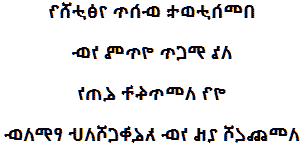Amharic love poem
ያ መስታወት
በመስታወቱ ውስጥ ገፅታሽን
ለኔ ምርጥ ግጥሜ ነው
ግን ለመጥፋት ፈጠነ
ለመጨረሻ ጊዜ ነው አፈቅርሻለሁ የምለው

Conversion Old South Arabian
ያ 𐩣ስታ𐩥ት
𐩨𐩣ስታ𐩥ቱ ውስጥ 𐩴ፅታሽን
𐩡ኔ ምርጥ ግጥሜ 𐩬ው
ግን 𐩡𐩣ጥፋት 𐩰𐩷𐩬
𐩡𐩣ጨ𐩧ሻ ጊዜ 𐩬ው 𐩱𐩰ቅርሻ𐩡ሁ 𐩺ም𐩡ው
A transliteration
Ya mesitaweti
Bemesitawetu wisit’i get͟s’itashini
Lenē mirit’i git’imē newi
Gini lemet’ifati fet’ene
Lemech’eresha gīzē newi āfek’irishalehu yemilewi

→ French poem ←
Amharic and literature
An Amharic love poem (የፍቅር ግጥም) in a Semitic language with the perfume of Ethiopia. The Amharic (alternative names: Ethiopian, Abyssinian, Amarinya, Amarigna, Amhara, Falasha, autonym : አማርኛ, Āmariññā, Amarəñña), official language in Ethiopia is since 1270 the language of the administration and the state. Nowadays, a quarter of the population speaks it, especially in the provinces of Begamedern Choa and Godjam. It is the mother tong of about 20 million people, living mostly in the vicinity of Adis Ababa and in the north. About 30 million others speak it as a second language.
Amharic is one of the semitic languages, which form a branch of the Afro-Asiatic family. The semitic languages were brought to Ethiopia perhaps as early as 1000 BC. Speakers of a south Arabian dialect from the kingdom of Saba in southwest Arabia crossed the Red Sea and settled in the highlands of Ethiopia. From the 4th century AD onward the principal language of the country was Ge'ez, the forerunner of all Ethiopic languages. The Amharic developed from a speech close to the Gueze, but underwent strong influences of the Cushitic languages, especially the galla. It thus presents significant divergences compared to the Gueze, and the Semitic substratum. These divergences affected the phonetics (disappearance of the laryngales, and appearance of many prepalatales).
Its written tradition is relatively recent: if it possesses a few poetic songs of the 14th century, it is only from the 19th century, that develops a literature, especially didactic. This language, is also spoken in other countries, Egypt, Israel etc.
Ethiopian woman
If the love poem of this mirror returns you her image, you will see all the love that reads in her eyes.
She's like those signs, soft and rounded ... that's her character! Her figure is balanced, thin and so feminine! But above all, it is her eyes and her voice that hypnotize ... and all who see her face, stop!. Perhaps she is their oasis, an oasis that they have been hoping for so long. But at home, in the depths of her heart, is written a first name, only one ... and they all pray that it is their. If one day you meet her, no doubt you will know!
Sometimes I say to myself: "I recognize her, This woman and all the others are the same one. Time on her has no hold. She is from all countries, and from all times, like a wandering soul, she is here and there. After to be Ethiopian, who will she be, where will our next meeting be? God only knows!"
Tigrinya poem